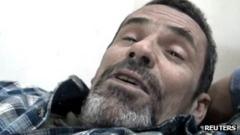Syria unrest: UK's Conroy freed from besieged city
- Published

Paul Conroy was smuggled across the border into Lebanon and is said to be in good spirits.
Injured British journalist Paul Conroy has been rescued from the Syrian city of Homs, but the whereabouts of French reporter Edith Bouvier remain unclear.
French President Nicolas Sarkozy has withdrawn an earlier statement that she was also safely in Lebanon.
The severely-injured Ms Bouvier is believed to have left Homs with Mr Conroy, but there are reports the rescue convoy was shelled.
The UN meanwhile says more than 7,500 people have now died in the crackdown.
UN human rights chief Navi Pillay said atrocities against civilians were being committed, and she had received reports that "massive campaigns of arrests" by Syrian troops against rebels had deprived many civilians of food, water and medical supplies.
Her comments came at an emergency meeting of the UN Human Rights Council (UNHRC) in Geneva, which renewed calls for a humanitarian ceasefire.
Syria's representative to the UN, Faysal Khabbaz Hamoui, stormed out of the session, accusing countries of "inciting sectarianism and providing arms".
Reports on Tuesday said Homs had come under some of its heaviest bombardment yet, with the government sending in units of an elite armoured division into rebel-held districts.
President Sarkozy's statement on the campaign trail that Ms Bouvier had reached safety came after nearly 24 hours of confusion over the journalist's fate. He later withdrew the statement, describing the situation as unclear and complex.
"It has not been confirmed that she is in safety in Lebanon," he told journalists in Montpellier. "Communications with Homs are very difficult."
The BBC's Jim Muir in Beirut says confusion remains over Ms Bouvier's location.
Campaign group Avaaz said it had co-ordinated an operation to free the wounded journalists and two trapped colleagues, and some of the activists involved had died in the process.
Avaaz executive director Ricken Patel said the rescue group had been split in two by shelling after leaving Homs, and only Mr Conroy's group had been able to move forward.
Avaaz described the three other journalists - Ms Bouvier, Javier Espinosa from Spain and Frenchman William Daniels - as "unaccounted for".
Mr Conroy was apparently able to walk across the border into Lebanon during the night, but our correspondent adds that the more seriously wounded Ms Bouvier would have had to be carried on a stretcher.
Both journalists were hurt in the attack in which journalists Marie Colvin and Remi Ochlik died. There has been no word on what has happened to their bodies.
Mr Conroy's brother Alan said the family still did not know where he was.
"When we've heard him on the phone or he turns up on the doorstep, then we'll be very happy," he said. "He's a very strong character anyway. He'll cope."
'War criminal'
In Washington, US Secretary of State Hillary Clinton has said that President Bashar al-Assad fits the definition of a war criminal.
She told a Senate hearing that an argument could be made for declaring the Syrian leader a war criminal.
Mrs Clinton added that such an action would complicate the chances of finding a solution to the violence - and tended to make it harder to persuade a leader to stand down.
As many as 125 people died across Syria on Monday, many of them in a single incident at a checkpoint in Homs, the activists' network the LCC said.
Sixty-five more were killed on Tuesday, it said. Death tolls remain very hard to verify as media access across the country is tightly restricted.
The emergency session of the United Nations Human Rights Council (UNHRC) discussed a confidential report delivered by a UN panel of experts that lists Syrian army officers and government officials who could be investigated for crimes against humanity.
French Foreign Minister Alain Juppe has urged the 47 nations in the council to be prepared to submit a complaint against Syria to the International Criminal Court (ICC) in The Hague.
"The task of the council is to express the disgust of the entire world at the odious crimes that the Syrian state is committing against its people," he said.
But the meeting is unlikely to bring about any change from the government in Damascus which is currently fighting for its survival, says the BBC's Jim Muir, in Beirut.
It is more likely to put pressure on countries such as Russia and China, which have opposed any international action against Syria, he adds.